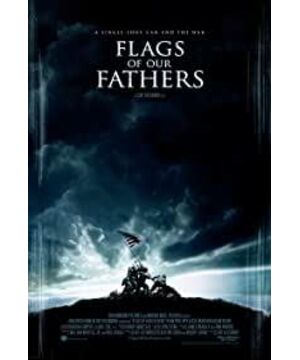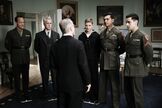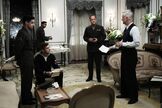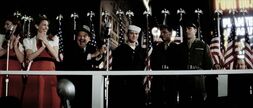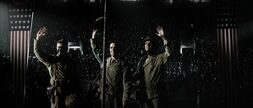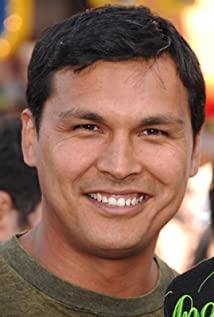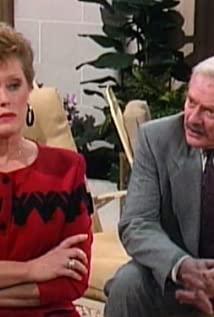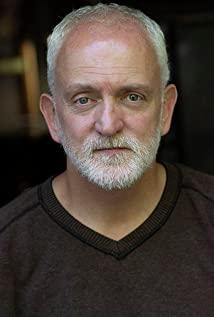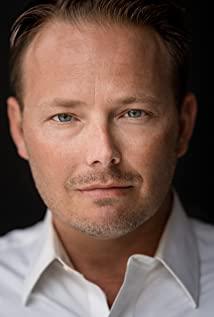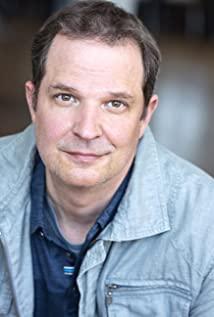What the two have in common includes a. not celebrating heroism, not celebrating or even opposing war, cherishing battlefield friendship, and reflecting on the values of war (this is basically the label of Spielberg's war films).
b. There are three protagonists.
Three characters in "The Pacific": Basron, the god of war, returned to the battlefield on his own initiative after being recalled to his homeland, and made his new wife receive the bad news of her death on her birthday; Sledgehammer, a young man, was deeply hurt by the brutal war, No more uniforms, no more guns. Only Leitch did not go to the extremes of either of the above two, but looked at the war more calmly, and looked at his memory of participating in the war, which is very rewarding (by the way, he also defeated the one who did not participate in the war but had a higher rank than him. officers thus win love).
This is the post-war life of the soldiers, in fact, in addition to life and death, it may even be more difficult than on the battlefield. There are various reasons, such as the "heroes" in this film questioning the meaning of heroes, such as the nightmares that murder brings them... In fact, what soldiers on the battlefield do, to a certain extent, is like In this film, the Indians say "dodge bullets", survive, someone wants to die, kill him. When they got off the battlefield, their lives were no longer in danger. They left the fox hole and sat on the sofa. They thought too much and re-washed every crazy thing they had done by themselves, their comrades, and the enemy. very tough. It is difficult for ordinary people to understand. To borrow the words of a father sledgehammer from "The Pacific": You never know what this kid has gone through.
Going back to the three protagonists of this film, the ideas of the arrangement are similar: Rene, who is obviously too addicted to the word "hero", including his wife. On some occasions, the people cheered, and the Indians smiled barely or not; Brad, smiled; Rene, smiling brightly, waved again, waved his hat. Like Basilone, he is too subjective to think of his heroic actions, and compared to Basilone, this "hero" even has a discount.
And the Indian—a racially discriminated person (not to mention the restaurant that bans Indians, but also the German restaurant that bans Jews), I disliked him at first- Insanely disgusted with fundraising, endless drinking, overly hostile toward Rene—overly naive, even markedly hypocritical. But when the high-ranked officer said a goddamn Indian to the hero they created, I began to feel that just like the young heart of the sledgehammer in "The Pacific", centuries of discrimination and repression have made this ordinary The heart of the Indian young man is also very fragile, so that he can't bear the pain of war, and he has to mourn for him and other people who fought for the country but suffered injustice in connection with his death.
The film's first-person James Bradley's father, like Lecky, seems to be the wisest person. During the war, he was a good DOC who took care of his comrades. After the recall his interest in war fundraising and the like was not necessarily the same as Rene's, but neither was the Indian cynicism. After the war, he didn't ask for this and that in the way that Rene was actually a hero, but he just bought a funeral home to raise the family, and he didn't confide the so-called heroic glory to the family - including that comrade-in-arms thing (should be the war against the family. His greatest damage. See also call out in a daze before fainting) is also revealed before death (he is still unconscious). He just lived like—in his son's words—an ordinary man; not like the other two to indulge in either the glory or the pain of the war, because the war is long gone.
One of my favorite details: the family sits at a long table to eat (Leckie also has it in "The Pacific"), the lovely son gets up to take care of his father's request for an interview, and then goes back to the table to eat - family fun.
What does that represent?
I've never been a hero, I'm not a soldier now - because the war is over, I'm just an ordinary person, that's all. Since God has let me go through the war, then I must live well and continue to live.
View more about Flags of Our Fathers reviews


